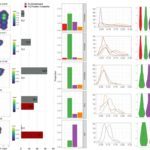Lien vers Pubmed [PMID] – 29084582
Genome Biol. 2017 Oct;18(1):207
BACKGROUND: Polycomb Repressive Complexes 2 (PRC2) are multi-protein chromatin modifiers that are evolutionarily conserved among eukaryotes and play key roles in the regulation of gene expression, notably through the trimethylation of lysine 27 of histone H3 (H3K27me3). Although PRC2-mediated gene regulation has been studied in many organisms, few studies have explored in depth the evolutionary conservation of PRC2 targets.
RESULTS: Here, we compare the H3K27me3 epigenomic profiles for the two closely related species Arabidopsis thaliana and Arabidopsis lyrata and the more distant species Arabis alpina, three Brassicaceae that diverged from each other within the past 24 million years. Using a robust set of gene orthologs present in the three species, we identify two classes of evolutionarily conserved PRC2 targets, which are characterized by either developmentally plastic or developmentally constrained H3K27me3 marking across species. Constrained H3K27me3 marking is associated with higher conservation of promoter sequence information content and higher nucleosome occupancy compared to plastic H3K27me3 marking. Moreover, gene orthologs with constrained H3K27me3 marking exhibit a higher degree of tissue specificity and tend to be involved in developmental functions, whereas gene orthologs with plastic H3K27me3 marking preferentially encode proteins associated with metabolism and stress responses. In addition, gene orthologs with constrained H3K27me3 marking are the predominant contributors to higher-order chromosome organization.
CONCLUSIONS: Our findings indicate that developmentally plastic and constrained H3K27me3 marking define two evolutionarily conserved modes of PRC2-mediated gene regulation that are associated with distinct selective pressures operating at multiple scales, from DNA sequence to gene function and chromosome architecture.

